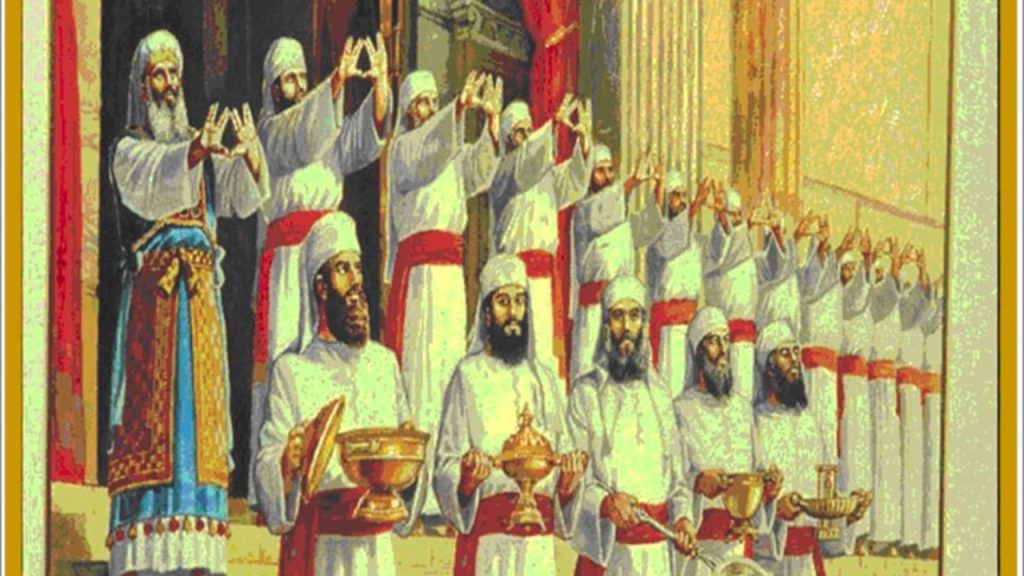In a nutshell
In our parashah, Balak, the king of Moav, the son of Zippor, tried to engage Bilaam for the purpose of cursing the migrating Israelite community. On his journey to meet the princes of Moav, Bilaam is stopped by an angel of G-d after beating his donkey. He tells the angel he will return home: “I have sinned, for I did not know that you stood against me on the road”. The angel instructs Bilaam to attend the meeting with the princes of Moav but to “say only what I tell you”. Bilam attempts to curse Bnei Israel three times, but each time he bless them instead. Also the people are being tempted by the daughters of Moav, and when an Israelite publicly takes a Midianite princess into a tent, Pinchas kills them both, attempting to stop the plague raging among the people.
Balak
After Bnei Israel had fought and defeated the mighty giants, Sichon and Og, Moav a much smaller nation than the others feared the Jews might find a way to conquer their land. The first step was to make peace with their long time enemies the Midyanim, in order to fight Bnei Israel. The second step was choosing a new king, Tzur, a famous prince of Midyan. He was the strongest and the wisest person at the time. Upon becoming the king of Moav, he was renamed Balak. His Job was to find a way to overcome the Jews.
The power of speech
Instead of organizing an army, Balak announced that it is pointless to fight Bnei Israel, knowing they will win. He wanted to discover wherein lies their secret power. Since Mosheh spent many years in Midyan, the Moavim asked the wisest man in Midyan wondering if he knew the secret of Mosheh great success. The wise man said “ The Jews don’t need an army. Their power is in their speech. Merely by mentioning G-d’s name the enemies fall dead! The Jews win their wars by praying.”
So the Moavim decided to find someone with supernatural powers, equal to Mosheh. They found Bilaam the magician, who was known for interpreting dreams and for cursing others. Balak wanted Bilaam to perform a black magic on Bnei Israel. When Bilaam tried to curse the Jewish people, he ended up blessing them instead.
Ma Tovu
One of his praises has become a part of our daily prayers; Mah Tovu, מַה טֹּבוּ אֹהָלֶיךָ, יַעֲקֹב; מִשְׁכְּנֹתֶיךָ, יִשְׂרָאֵל “How good are your tents, Jacob your dwelling places, Israel.”
Our sages explain that Bilaam saw that the Jews lived in modesty. Having their tents not facing the entrances of the other tents, as a way to attain and maintain a certain level of a much needed privacy. Modesty and being Jewish goes hand in hand. Modesty is embedded within our life. Within the way we live, the way we dress, the way we walk, the way we talk, and even in the way we eat and drink.
Ma Tovu teaches us about modesty at all times and places. At your dwelling place, your home, or when in temporary places, like a vacation. Being modest is the correct way to live, as we learn in our parashah, modesty has the power to transform curses into blessings. Kol tuv.

WOULD YOU LIKE TO READ HEBREW?
THE BEST TIME TO PLANT A TREE WAS 20 YEARS AGO. THE SECOND BEST TIME IS NOW!
Take your first step, and in as little as 9 hours of BeCHAVRUTA Crash Course Book, you will be able to Read Hebrew Fluently & Accurately like a Pro!
PRE ORDER RABBI YAKIRA NEW BOOK “LEARN TO READ HEBREW IN 18 STEPS”
“Original, fun, and effective, this is a superb way to learn to read Hebrew.“- DENNIS PRAGER
“A clear, lucid and immensely helpful guide to learning Hebrew. Takes the reader by the hand and introduces the holy tongue in living color.“-RABBI DAVID WOLPE

“An instant classic! Rabbi Yakira has written a primer on Hebrew that is both enchanting & colorful. It is sure to capture the interest of students & magically introduce them to the Hebrew language!”-RABBI DR DAVID ELLENSON
PRE ORDER RABBI YAKIRA NEW BOOK “LEARN TO READ HEBREW IN 18 STEPS”
The 613 Mitzvot
The commandment of the tzitzit. The word tzitzit is related to the root word lehatzitz- to look, therefore a tzitzit is an object at which we look . In addition, the word tzitzit numerical value is 600. The tzitzit has 8 threads and 5 double knots in each corner (8+5=13), thus a tzitzit represents the 613 mitzvot in the Torah.
In The Torah there are 613 commandments, mitzvot, also known as the Law of Moses (תרי״ג מצוות, taryag mitzvot). The 613 mitzvot are first recorded in the 3rd century CE, when Rabbi Simlai mentioned it in a sermon that is recorded in Talmud Makkot 23b.
The 613 commandments include 248 “positive commandments”, to perform an act (mitzvot aseh), and 365 “negative commandments”, to abstain from certain acts (mitzvot lo taaseh). The negative commandments number 365, which coincides with the number of days in the solar year, and the positive commandments number 248, a number ascribed to the number of bones and main organs in the human body.
Though the number 613 is mentioned in the Talmud, its real significance increased in later medieval rabbinic literature, including many works listing or arranged by the mitzvot. The most famous of these was an enumeration of the 613 commandments by Maimonides, The Rambam.
Many of the mitzvot cannot be observed now, following the destruction of the Second Temple, although they still retain religious significance. According to one standard reckoning, there are 77 positive and 194 negative commandments that can be observed today, of which there are 26 commands that apply only within the Land of Israel. Furthermore, there are some time-related commandments from which women are exempt (examples include shofar, sukkah, lulav, tzitzit and tefillin). Some depend on the special status of a person in Judaism (such as kohanim), while others apply only to men or only to women. According to Rambam Organized by Parshah. based on Wikipedia and http://www.vaadrv.org/rambam613mitzvot.asp ONE BIG IMPORTANT NOTE WHEN USING THIS LISTING: This listing is not all inclusive. Rambam may site multiple sources for a mitzvah is his works but this list currently only gives one source for each mitzvah.
The Priestly Blessing
Check out YedidYah “The Priestly Blessing” Birkat Hakohanim. Music by Rabbi Yakira Yedidia https://youtu.be/YNE11QdEMN0
יְבָרֶכְךָ יהוה, וְיִשְׁמְרֶךָ- May the LORD bless you and guard you
יָאֵר יהוה פָּנָיו אֵלֶיךָ, וִיחֻנֶּךָּ -May the LORD make His face shed light upon you and be gracious unto you
יִשָּׂא יהוה פָּנָיו אֵלֶיךָ, וְיָשֵׂם לְךָ שָׁלוֹם- May the LORD lift up His face unto you and give you peace
Yevarechecha Adonai, V’Yishmerecha
Ya’er Adonai Panav Eleycha, ViChoneka
Yisa Adonai Panav Eleycha, V’Yasem Lecha Shalom
(Number 6:24-26).
Check out YedidYah “The Priestly Blessing” Birkat Hakohanim. Music by Rabbi Yakira Yedidia https://youtu.be/YNE11QdEMN0
Check out YedidYah Psalm 96 “Yiram Hayam” Music by Rabbi Yakira Yedidia https://youtu.be/aTBD4i9nvXw

This blog article was inspired by chabbad.org, Sefaria.org, Wikipedia.org,

